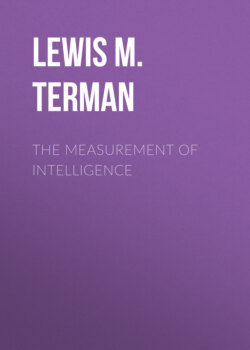Читать книгу The Measurement of Intelligence - Lewis M. Terman - Страница 36
На сайте Литреса книга снята с продажи.
Some avowed limitations of the Binet tests.
ОглавлениеTable of Contents
The Binet tests have often been criticized for their unfitness to perform certain services which in reality they were never meant to render. This is unfair. We cannot make a just evaluation of the scale without bearing in mind its avowed limitations.
For example, the scale does not pretend to measure the entire mentality of the subject, but only general intelligence. There is no pretense of testing the emotions or the will beyond the extent to which these naturally display themselves in the tests of intelligence. The scale was not designed as a tool for the analysis of those emotional or volitional aberrations which are concerned in such mental disorders as hysteria, insanity, etc. These conditions do not present a progressive reduction of intelligence to the infantile level, and in most of them other factors besides intelligence play an important rôle. Moreover, even in the normal individual the fruitfulness of intelligence, the direction in which it shall be applied, and its methods of work are to a certain extent determined by the extraneous factors of emotion and volition.
It should, nevertheless, be pointed out that defects of intelligence, in a large majority of cases, also involve disturbances of the emotional and volitional functions. We do not expect to find perfectly normal emotions or will power of average strength coupled with marked intellectual deficiency, and as a matter of fact such a combination is rare indeed. In the course of an examination with the Binet tests, the experienced clinical psychologist is able to gain considerable insight into the subject’s emotional and volitional equipment, even though the method was designed primarily for another purpose.
A second misunderstanding can be avoided by remembering that the Binet scale does not pretend to bring to light the idiosyncrasies of special talent, but only to measure the general level of intelligence. It cannot be used for the discovery of exceptional ability in drawing, painting, music, mathematics, oratory, salesmanship, etc., because no effort is made to explore the processes underlying these abilities. It can, therefore, never serve as a detailed chart for the vocational guidance of children, telling us which will succeed in business, which in art, which in medicine, etc. It is not a new kind of phrenology. At the same time, as we have already pointed out, it is capable of bounding roughly the vocational territory in which an individual’s intelligence will probably permit success, nothing else preventing.[14]
In the third place, it must not be supposed that the scale can be used as a complete pedagogical guide. Although intelligence tests furnish data of the greatest significance for pedagogical procedure, they do not suggest the appropriate educational methods in detail. These will have to be worked out in a practical way for the various grades of intelligence, and at great cost of labor and patience.
Finally, in arriving at an estimate of a subject’s grade of intelligence and his susceptibility to training, it would be a mistake to ignore the data obtainable from other sources. No competent psychologist, however ardent a supporter of the Binet method he might be, would recommend such a policy. Those who accept the method as all-sufficient are as much in error as those who consider it as no more important than any one of a dozen other approaches. Standardized tests have already become and will remain by far the most reliable single method for grading intelligence, but the results they furnish will always need to be interpreted in the light of supplementary information regarding the subject’s personal history, including medical record, accidents, play habits, industrial efficiency, social and moral traits, school success, home environment, etc. Without question, however, the improved Binet tests will contribute more than all other data combined to the end of enabling us to forecast a child’s possibilities of future improvement, and this is the information which will aid most in the proper direction of his education.
